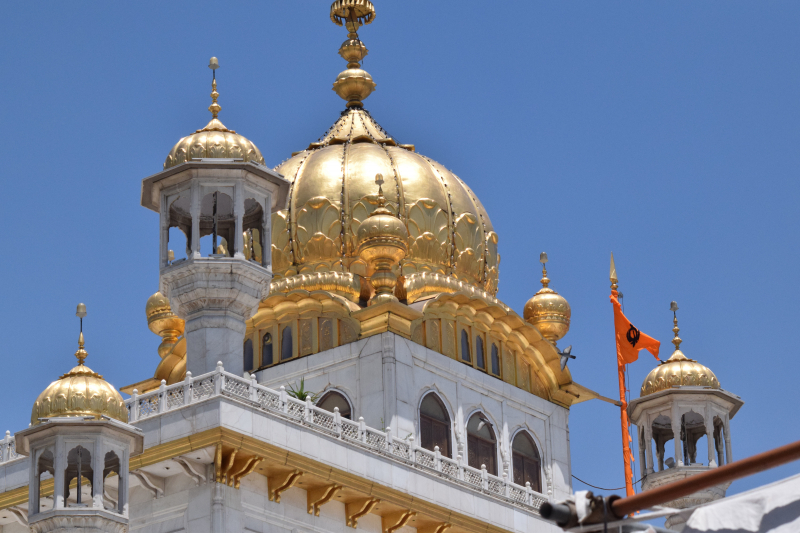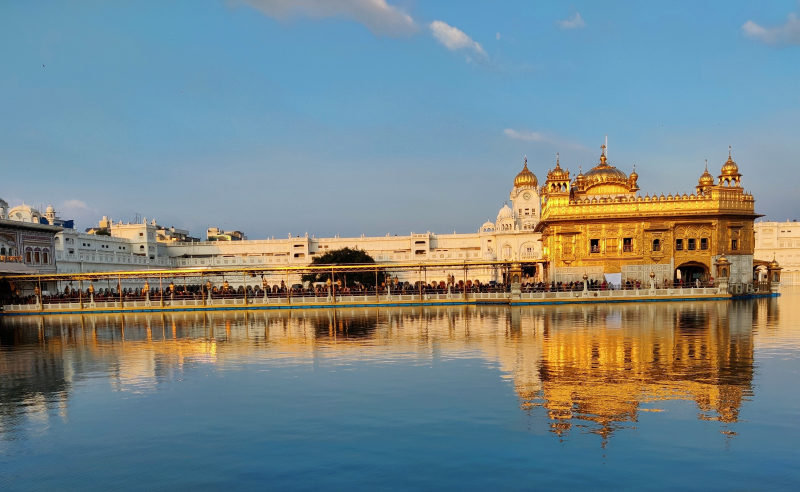Sikhism culture manifests itself in Marriage, Death, Food and Festivals
Sikh Marriage:
- The Sikh marriage ritual is known as Anand Karaj, which means "joyful union".
- To be allowed to participate in this wedding ceremony, both spouses must adhere to the Sikh faith.
- Child marriage is forbidden, and Sikh boys and girls are free to meet without the influence of their parents. Assisted weddings do occur, though, and the son or daughter has the option of accepting the mate chosen for them.
- The wedding ceremony is held in front of a copy of the Guru Granth Sahib. The husband reads the verses and walks his wife around the holy book four times.
- Divorce has traditionally not been an option for Sikhs because the gurus did not divorce, but modern attitudes about instances when the marriage has permanently broken down imply that Sikhs may go to the community and ask for permission to divorce and remarry.
Sikh Death:
- Sikhs believe that death is a natural process and an opportunity for the soul to be reunited with God.
- The Sikh burial ritual is known as "Antam Sanskaar" and it focuses on celebrating the conclusion of life rather than mourning the person's death.
- Sikhs are cremated, and their ashes are either buried or strewn across a body of flowing water, such as a river or sea.
- Sikhs believe in reincarnation, or the idea that people's souls go through a variety of living forms and life cycles before becoming pure and able to be reunited with God.
Sikh Food:
- The teachings of Sikh gurus imply a preference for a diet of basic foods and that people should eat in moderation. Sikhs can opt to be vegetarians or consume meat.
- The Landar, the Gurdwara's community kitchen, only provides vegetarian food in order to be welcoming to everybody, regardless of faith or inclination.
- Traditional Sikh cuisine includes roti and pulka. Wholemeal flour is used to make these flatbreads.
- Many Sikh recipes, whether meat or vegetarian, incorporate sabzi (cooked veggies) and daal (cooked lentils).
Although the offering of a sweet dish, or "pudding", after a meal is not regarded as vital, Sweet rice pudding (kheer) and milk- and sugar-based barfi are popular Sikh treats. Pakoras, fried spicy balls of potatoes and onions, and samosas, triangular-shaped pastries with varied fillings, are two savory appetizers.
Sikh Festivals:
A Sikh can worship at any time of day or night, but the most common periods are before sunrise and sunset, as well as before retiring to bed at night. A Sikh, in general, meditates ("simran") on the Name of God by chanting His Name (the Magnificent Lord, Waheguru) even while working.
Every year, there are a number of Sikh festivals known as Gurpurbs, which are related to the birth and death anniversaries of the Gurus. These are a few examples:
- The birth dates of ten Sikh Gurus The birthdays of Guru Nanak Dev Ji (the first Guru) and Guru Gobind Singh Ji (the tenth Guru), as well as the martyrdom days of the fifth and ninth gurus, are especially significant. On certain occasions, Sikhs follow the "Akhand Path," which involves reading the Granth Sahib continuously for 48 hours.
- The five Sikhs baptized by the tenth Guru, Gobind Singh, are commemorated. This is known as Khalsa Advent Day ("Baisakhi"). This is also a noteworthy day because it symbolizes the beginning of the wheat harvesting season and Sikh New Year's Day.











